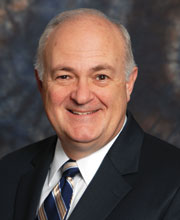A Conversation With President Knapp

In this edition, we asked GW President Steven Knapp about D.C. Mayor Vincent Gray, BS '64, the university's commitment to cultivating leaders in public service, and GW's involvement in the local community.
Q What has it been like to get to know Vincent Gray?
A I first met Mayor Gray in his office in 2007 when I was a new president and he was serving as chairman of the D.C. Council. I have since had many opportunities to come to know him as a very thoughtful, knowledgeable, and dedicated public servant.
The first time, though, that I heard the extraordinary story of his experience at George Washington in the 1960s was in October 2009, when we had the honor of conferring on him the Distinguished Alumni Achievement Award. Everyone in attendance was both moved and sobered by his eloquent account of the barriers he faced at what was still a very segregated institution and how he rose to the challenge, among other achievements becoming the first African American to be elected president of a fraternity. He pulled no punches, and yet he spoke without bitterness and conveyed a genuine affection for the institution, despite what he went through.
At his inauguration this past January, a whole row in the Washington Convention Center was filled with his Tau Epsilon Phi fraternity brothers, and the generosity with which he acknowledged and asked them to rise was, well, simply inspiring. It would be an understatement to call that a proud moment for GW!
Q What is George Washington doing to develop the next generation of leaders in public service?
A I guess everyone knows that our university was founded in response to a vision spelled out by George Washington himself: the vision of a university in the nation's capital that would educate citizen-leaders for the new republic. So that mission has been part of the fabric of GW since its inception, and there is no question that many of the students we draw to the university come to us with an already well developed passion for service. But I have felt since arriving here that the university could do more to make it easier for students both to find service opportunities and to connect their service activities in deeper ways with what they are learning in the classroom.
We were very fortunate two years ago when, partly in response to a discussion of service during a summer retreat of the board of trustees, one of our very strong alumni families, the Lerners, decided to support the creation in our Law School of an associate deanship for public service and public interest law. We were equally fortunate that Dean Lawrence was able to recruit the distinguished public interest attorney Alan Morrison as the first person to serve in that position. With his help, we created a university-wide office of civic engagement and public service, and I was delighted that we were able last spring to persuade a nationally recognized expert, Amy Cohen, to head that office.
Between the creation of those two offices, in fall 2009, we established the Colin Powell Public Service Award. We conferred the first award on our alumna Tammy Duckworth, a decorated Iraq War hero who currently serves as an assistant secretary in the U.S. Department of Veterans Affairs.
But I have to say that what has really focused my attention on service has been the enthusiasm and inventiveness of our students. We see that, for instance, in the many ways in which students are spending their winter and spring breaks as well as their summers on service projects both in Washington and around the world. It was the work of students like Anna Phillips, who founded a women's soccer league in Uganda for survivors of war and abuse, that inspired Diane and me to endow a fellowship for what we are calling entrepreneurial service-learning. The fellowship will go to a student or group of students who need extra support to help them combine service and learning in imaginative ways that, we hope, will inspire their fellow students and generate new ideas for making a difference in the lives of others.
Q Why is it important for George Washington to be active in the local community?
A We have been a part of the greater Washington metropolitan region since our founding here in 1821. Today, we are among the largest private employers in the District of Columbia and a major driver of economic activity in the region through our operations, our faculty, staff, and students, and the more than 70,000 George Washington alumni who live and work here.
The success of GW and Washington are strongly interdependent. Our faculty and staff live here and want good schools, reliable services, and a safe environment. And our students are attracted to GW in no small measure because it is part of a vital capital city. So it is certainly in our institutional interest—as well as our responsibility—to do everything we can to help make this city a vibrant, flourishing community.
Finally, by engaging in service to the community, our students enrich their educational experience in countless ways. Whether through service projects with the D.C. Public Schools and other community partners or through internships and community-based research projects, service to the community gives them a unique opportunity to test the skills and knowledge they acquire in the classroom in the laboratory of the real world.
Do you have a topic you would like President Knapp to address in a future edition? Please submit your ideas at magazine@gwu.edu.
